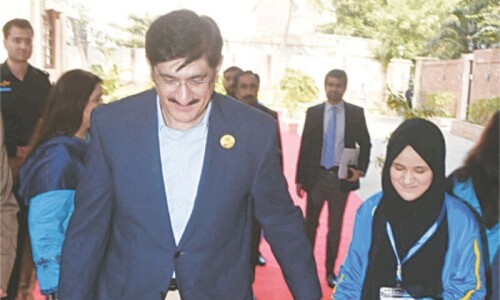KARACHI: The Sindh High Court on Thursday directed the Karachi Metropolitan Corporation to complete the exercise of reviewing an agreement about collection of controversial Municipal Utility Charges and Taxes (MUCT) through electricity bills and placing the same before the City Council within three months.
However, the SHC also asked the KMC to proceed with its actions in compliance with applicable law and ruled that any resolutions or notifications issued by the corporation must be considered provisional and subject to the final determination of a petition filed against various provisions of KMC and MUCT rules.
A two-judge bench of the SHC headed by Justice Salahuddin Panhwar passed these directives while disposing of three petitions filed in 2022, challenging the resolution of the KMC administrator and various notifications issued in respect of an agreement inked with K-Electric about collection of controversial MUCT for KMC through the powers bills.
The bench in its order said that a fourth connected petition, filed in January this year, impugned the validity (vires) of the rules promulgated by the local government, and the lawyer for petitioner cited various legal precedents in the matter.
In Sept 2022, the SHC through an interim order had restrained the power utility from collecting MUCT through electricity bills in three identical petitions. The lawyer for petitioner in a recently filed petition also sought a similar relief.
However, the bench in its order noted that due to paucity of time, the hearing on the fourth petition (233/24) was adjourned being part-heard for the second week of August and the injunction application in that petition will also be decided with main petition.
“With regard to ad-interim injunction in peculiar circumstances we are of the view that same cannot be extended in this petition at this stage”, it added.
In 2022, the then Karachi chief of Jamaat-i-Islami Hafiz Naeemur Rehman and others had filed separate petitions against the provincial government’s move to outsource the MUCT collection to the KE.
The bench observed that the KMC (Collection of Municipal Utility Charges and Tax) Rules 2002, were legislative instruments governing the levy and collection of municipal utility charges and taxes within Karachi.
It also said the proponents within the KMC submitted that robust collection systems were imperative for the financial fortification of the corporation. Conversely, the legitimacy of the KMC’s provisional administration to enforce these levies had been called into question and to encapsulate, such rules were designed to facilitate the efficient appropriation of municipal utility charges and taxes in Karachi, with an emphasis on the utilisation of electricity billing as the primary collection conduit, it added.
The order further said, “Nonetheless, the juridical scrutiny and contractual dynamics between KMC and K-Electric are under judicial review by this court in Constitution Petition No. D-233 of 2024, wherein the constitutional validity of the said rules is being contested”.
The bench observed that Mayor Murtaza Wahab had appeared in court during the arguments and the bench raised the question of the impugned resolution’s validity as the same was allegedly enacted by the administrator and not the City Council.
It ruled that under applicable law, the council held the authority to enact resolutions and not the administrator.
Subsequently, the mayor submitted a statement regarding the approval of the resolution as per law after due deliberation and its circulation among the public.
Mr Wahab in his statement submitted that the KMC will review the impugned agreement with KE to ensure that only service charges were directly deductible by power utility and no other deduction must be made directly while a special committee of council members will be constituted to deliberate on the subject issue and the same will be placed before the City Council for approval.
The mayor also submitted that deliberations will also be made to maximise the tax collection for Karachi, but some relief will be given to citizens receiving power bill of Rs10,000 or less per month.
The SHC in its order also noted that lawyers for petitioners did not contest the taxation imposed by the KMC to reinforce the municipal council’s efficacy, but they expressed concerns regarding non-passage of pertinent resolution by the City Council coupled with apprehensions that the council members may not be granted the opportunity for deliberation.
However, the bench stated that the mayor’s statement indicated an intention to establish a committee inclusive of representatives from all political parties.
“Following the observance of due legislative process, the council will then proceed accordingly. Besides, Mayor KMC has categorically contended that they will examine the number of units in the electricity bills and, up to 300 units they will extend relief to the common man living below the standard life and who cannot afford more financial burden. This exercise shall be completed within three months,” it concluded.
Published in Dawn, May 31st, 2024













































Dear visitor, the comments section is undergoing an overhaul and will return soon.